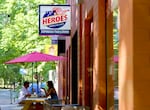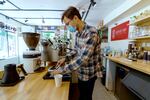As Portland emerges from the pandemic, there is no shortage of people speculating whether the city’s downtown will re-emerge with it.
That’s especially true of the area’s small business owners, who want to know if they can expect their old customers and tourists to return to the city’s economic hub — or if maybe they should start thinking about moving elsewhere.
OPB is tracking the recovery of downtown as the city comes out of the pandemic. Last week, we looked at the question of how people are measuring the challenges facing downtown.
This week, we’re looking at another basic question: After a year unlike any other, do the small businesses that survived want to stick around?
We examined one downtown street where many business owners are asking that question — and everyone seems to be arriving at a different conclusion.

In J Coffee, in Portland, June 8, 2021, is located on the Park Blocks near Portland State University. At the start of the pandemic sales plummeted but have slowly been improving as weekend visitors are returning.
Kristyna Wentz-Graff / OPB
In one tumultuous May night, Yousif Jabbary lost $20,000 worth of products and equipment from his market on the South Park Blocks.
It was the first night of racial justice protests in downtown Portland. He arrived at his store in the middle of the night to find his front door smashed, his computer stolen, the camera system broken and the store’s supply of e-cigarettes and tobacco products gone.
“They just grabbed whatever they wanted and walked out,” Jabbary recalled.
Park Avenue Market has both your typical convenience store items and a large array of Middle Eastern products. Jabbary, who is from Iraq, keeps the shelves stocked with henna dye, fresh baklava and Turkish coffee.
His store is one of three located on the intersection of Southwest Clay and Park. It’s a spot that’s seen its share of unrest this past year. The usual stream of tourists and downtown workers disappeared at the start of the pandemic. Racial justice protesters regularly marched through the area. People continue to break store windows, tag storefronts with graffiti, and steal merchandise.
That night in May was the first of what would be four break-ins to hit the market in 2020. Jabbary’s patience is waning.

Heroes American Cafe in Portland, June 16, 2021. The business, owned by John Jackson, was a month old when someone shot into the store during a protest march against police brutality. The customer base consists of mainly residents from the neighborhood.
Kristyna Wentz-Graff / OPB
“I don’t think I want to stay here anymore,” he said. “This is a bad, bad experience. And we never have this kind of problem [in] downtown Portland.”
In a survey of downtown business owners and managers conducted at the end of last year by the Portland Business Alliance, a little over a quarter said they planned to relocate out of downtown in the next two years. At the time, business owners cited the pandemic as their top concern.
After two decades as a downtown business owner, Jabbary says he has little interest in sticking around for a third. After he locks up the store at night, he will sometimes sit in his car and watch over the storefront until morning.
He said he’s fed up, wondering why the onus of keeping his business safe has fallen on him and not the city.
“You have all the tools to keep residents safe, the businesses safe. You are the system,” said Jabbary, addressing the city, county and state in one breath. “You’re the government. You are the leader, the officer. You have all the tools.”
He is not the only business owner on the corner who feels left high and dry.
John Jackson owns Heroes American Cafe on the northeast corner of Park and Clay. He opened in September, his fourth Oregon location. It’s a typical burger shop with a patriotic theme. The walls are lined with glossy poster-sized photos of teachers, firefighters and veterans.

Joe Yang works in his shop, In J Coffee, in Portland, June 8, 2021. At the start of the pandemic sales plummeted but have slowly been improving as weekend visitors are returning.
Kristyna Wentz-Graff / Kristyna Wentz-Graff
Jackson, a Black veteran, said he intentionally did not put up pictures of police in his Portland location. But he is proudly pro-law enforcement. During a mass uprising against police brutality, he thinks this support made him a target.
In October, on a night when protesters marched down the South Park Blocks and toppled two statues, someone shot into his store. The business had been open for less than one month.
Jackson said police didn’t show up for hours that night. He grew frustrated that someone could so publicly shoot into his store with so little accountability.
“I was so upset with the city’s response to my windows being shot out — with the police response, with the mayor’s response, with everybody’s response,” he said. “... Being African-American, if I pulled the gun out and started shooting, I probably would be dead right now.”
But the shooting brought him a bizarre silver lining: New customers.
The police started stopping by to show their support. Conservative media outlets picked up the story as did a Russian TV station. The BBC profiled him. Customers started showing up from across the city to get a burger.
Jackson describes it as a weird blip in his restaurant’s short life. His customer base has become more typical since then — mainly residents from the neighborhood. As the weather warms and more people are vaccinated, more of them are starting to stop by.

Nikki Guerrero, owner of Hot Mama Salsa, June 18, 2021. Guerrero sells her wares at the farmers market by Portland State University, and says that 2020 was one of her steadiest years for sales.
Kristyna Wentz-Graff / OPB
“They want us to succeed. I think people empathize with this and they understand that it’s been a struggle,” he said. “I think the community is going to make sure we stay here.”
There’s one more store owner on that corner, one who said he has never doubted he wanted to stay.
Joe Yang moved to Portland from China two and a half years ago for a simple reason. He takes coffee very seriously and he heard that Portland did too.
He decided to locate his coffee shop, In J COFFEE, on the Park Blocks, in part, because it was so close to Portland State University, which could drum up a constant stream of caffeine-seeking students.
For a year, it did. Then sales plummeted with the pandemic. For the first month, he said he was making less than $100 a day in sales.
“I just started, so I cannot give up,” said Yang. “I just want to try to hang.”
In June, as the city emerges from the pandemic, Yang reckons he’s just about made it through. Weekend visitors are returning. Portland State University will open up for in-person classes this fall.
As long as the university’s not going anywhere, Yang’s not either.
“I cannot move,” he said. “I feel they need me here.”
In a year unlike any other for downtown Portland, there was one spot of normalcy a little further south: the farmers market by Portland State University.
The outdoor market, located toward the southern end of the South Park Blocks, is home to about 50 or so small businesses. Hot Mama Salsa has been one of them for about five years.
Owner Nikki Guerrero said the market, which she attends every Saturday with the sole exception of Christmas weekend, was critical for getting word out about her fresh salsa, hot sauces, and chili oils. When the pandemic hit, she shared the concern of every other business owner in the city that business would dry up.
But the sales cliff never came. Sure, tourists disappeared and Portlanders were less willing to drive from other neighborhoods and explore. But there was also a host of people suddenly finding themselves doing more home-cooking than ever before and looking for ingredients.
“It was really kind of this community hold out where people did get to feel good about what they were doing and being out around other people,” said Guerrero.
In a flip of the script, Guerrero said 2020 was one of her steadiest years for sales.
She’s not alone. Wambui Machua, owner of Spice of Africa, said the downtown farmers market was a strange bright spot in what was otherwise a dismal year for her businesses. After 13 years doing cooking classes and market, Machua started her brick-and-mortar restaurant in Portland’s Buckman neighborhood in February.
One month later, the pandemic would slow sales to a trickle.
“The farmer’s market was a boon for us,” she said. “That’s what actually helped us survive and was helping take care of the restaurant.”
Both women sit on the market’s board. Machua said she had little doubt both she and the market were staying downtown.
Guerrero agreed — though after a year like 2020, she wasn’t making any bets.
“I think the market will remain stable, but we’re all operating from this place that’s like, who the hell knows? Who the hell knows what is going to happen anymore?”


